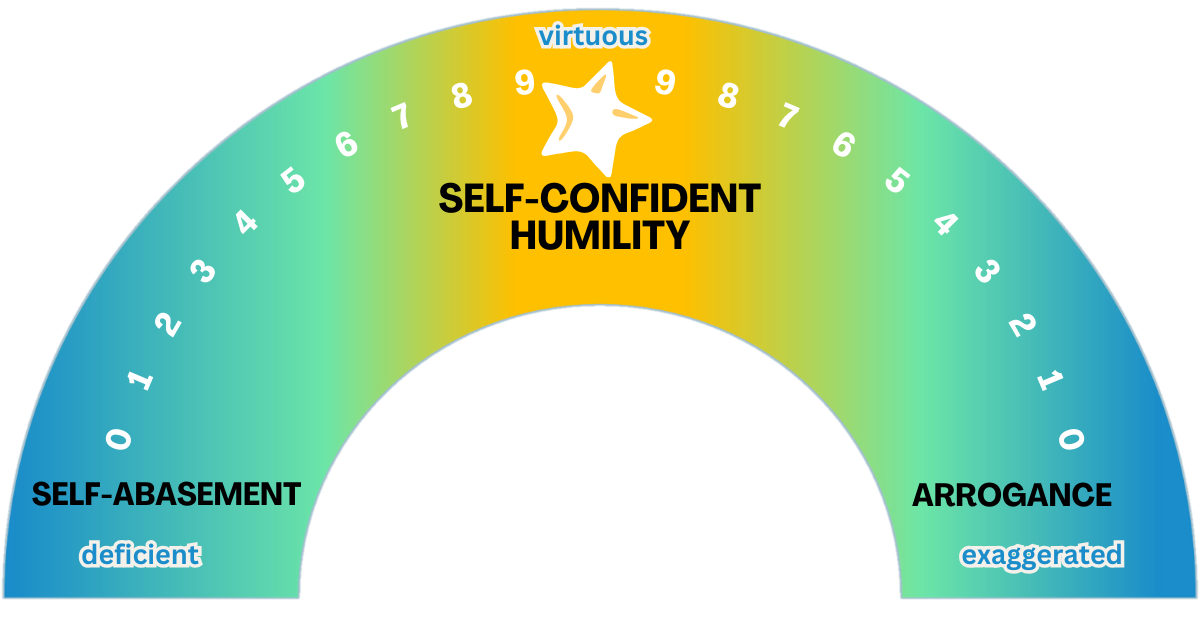In our journey through life, our sense of self-worth profoundly influences how we perceive ourselves and interact with the world around us. Each individual harbors unique perceptions and attitudes regarding their own value and capabilities. In this section, we’ll explore the character traits and attitudes that shape our feelings of self-worth and how they impact our lives.
The Continuum
Along the continuum of self-worth, individuals can fall at various points. On one extreme is self-abasement, characterized by demeaning or belittling oneself. On the other extreme is arrogance, marked by an inflated sense of superiority and entitlement. The virtuous path lies in the center, where individuals acknowledge their strengths and weaknesses with clarity, maintaining self-assurance while remaining open to feedback and respectful of others’ perspectives.
People may find themselves at various positions on this continuum. To make things even more complex, some may shift their position based on the circumstance. For instance, someone might exhibit humility in personal achievements while demonstrating confidence and assertiveness in professional settings.
Self-Abasement: On one end of the spectrum, there are individuals who consistently belittle themselves, often expressing feelings of unworthiness and inadequacy. They may engage in self-deprecating behavior and struggle to recognize their own value.
Self-Doubt: Moving along, we encounter those who harbor uncertainty about their abilities and decisions. They may second-guess themselves frequently, seeking reassurance from others and hesitating to take action due to fear of failure.
Self-Confident Humility: In a balanced state, individuals acknowledge their strengths and weaknesses with clarity. They approach situations with a grounded sense of self-assurance, yet remain open to feedback and respectful of others’ perspectives.
Over-Confidence: Continuing along the continuum, there are those characterized by an exaggerated sense of self-assurance. They may overlook their limitations and disregard feedback, leading to potential errors in judgment and strained relationships.
Arrogance: Finally, at the far end, there are individuals who display an inflated sense of superiority and entitlement. They often dismiss others’ contributions and viewpoints, believing themselves to be inherently superior in every aspect.
Benefits of Self-Confident Humility
When we cultivate a balanced sense of self-worth, striking the right balance between self-abasement and arrogance, we foster healthy self-esteem and confidence, thereby enhancing our overall well-being and positively impacting our relationships and interactions with others.
Here are some benefits:
Stronger Relationships: Humility fosters genuine connections with others by promoting active listening, empathy, and respect. People are more likely to trust and confide in humble individuals, leading to stronger and more fulfilling relationships.
Personal Growth: Humility encourages a mindset of continuous learning and self-improvement. By acknowledging our limitations and being open to feedback, we can identify areas for growth and development, leading to greater self-awareness and fulfillment.
Effective Leadership: Humble leaders inspire trust and loyalty among their team members. They prioritize the collective good over personal gain, empowering others to succeed and fostering a culture of collaboration and innovation.
Conflict Resolution: Humility enables individuals to approach conflicts with grace and understanding. By putting aside ego and seeking common ground, humble individuals can navigate disagreements more effectively, leading to mutually beneficial resolutions.
Emotional Well-being: Living with humility promotes inner peace and contentment. By accepting things as they are and letting go of the need for validation or recognition, individuals can experience greater emotional resilience and a deeper sense of fulfillment.




